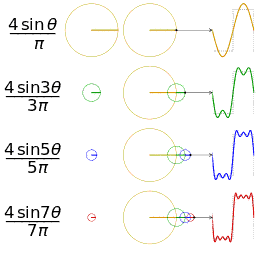Wikipedia:Reference desk/Archives/Mathematics/2024 August 23
Appearance
| Mathematics desk | ||
|---|---|---|
| < August 22 | << Jul | August | Sep >> | Current desk > |
| Welcome to the Wikipedia Mathematics Reference Desk Archives |
|---|
| The page you are currently viewing is a transcluded archive page. While you can leave answers for any questions shown below, please ask new questions on one of the current reference desk pages. |
August 23
[edit]Perpendicular projection of Fourier rotating epicircles
[edit]
The animation shows how a Fourier series approximates a square wave.
I'm curious if instead of projecting the point horizontally, we project it vertically (or any other angle), what waveform do we get?
(I know all the terms will have cosine instead of sine, but is their sum meaningful?)
Thanks, cmɢʟee⎆τaʟκ 23:52, 23 August 2024 (UTC)
- So basically, factoring out the constant, instead of
- you want
- Notice that the series diverges at multiples of π. The graph zig-zags between positive and negative infinity, with asymptotes toward infinity at the even multiples of π, and asymptotes toward negative infinity at the odd multiples. I think it's possible to work out a closed formula, but I think I'll leave that as an "available upon request" kind of thing, since it will take time to work out and the result may not mean much to you. (Unless someone else wants to work it out.) See this Alpha result for a quick and dirty sketch. (Does anyone know how to get Alpha to find the closed formula for the infinite sum? I tried a few times but kept getting "could not determine the general term.") --RDBury (talk) 04:24, 24 August 2024 (UTC)
- I did
- But Alpha only gave me a partial sum formula with complicated Lerch transcendent terms. Under the assumption that those terms tend to , it would seem that the function is explicitly equal to
- GalacticShoe (talk) 07:58, 24 August 2024 (UTC)
- Many thanks, @GalacticShoe and @RDBury. Good use of WolframAlpha. Guess the result isn't very interesting. Cheers, cmɢʟee⎆τaʟκ 09:44, 24 August 2024 (UTC)
- I think that what Wolfram Alpha is telling you is trivial: Let Then Then do a bit of algebra and take the antiderivative. Basically all of the work is the final line (showing that the sum actually converges). 100.36.106.199 (talk) 15:08, 24 August 2024 (UTC)
- Worth noting that this further simplifies down to
- Or
- GalacticShoe (talk) 15:40, 24 August 2024 (UTC)
- Nice closed formula. It doesn't seem to have much interesting application, unlike just the first term giving cosine. Thanks, cmɢʟee⎆τaʟκ 22:01, 24 August 2024 (UTC)
- Many thanks, @GalacticShoe and @RDBury. Good use of WolframAlpha. Guess the result isn't very interesting. Cheers, cmɢʟee⎆τaʟκ 09:44, 24 August 2024 (UTC)
- I did









